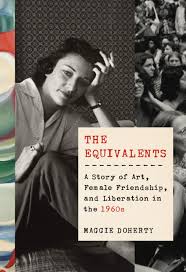
I just finished “The Equivalents” by Maggie Doherty which explores the beginnings of the Radcliffe Institute in the mid 1960’s. There the poets Anne Sexton and Maxine Kumin, the artists Barbara Swan and Marianna Pineda, and writer Tillie Olsen all met in this special atmosphere for a year. Each had a stipend and a place to work and they met with the other participants for weekly seminars where each shared their work. The artists were called “equivalents” since they didn’t fit the requirement of advanced scholarly work demanded of other members of the Institute.
I read the book a chapter a night, savoring it totally and loathe to finish it at all, much less quickly. But when I was done the only person I wanted to talk to about it was “J” my close college friend and fellow English major. We had attended the American poetry class together, talked poetry frequently and went to poet readings, including one given by Anne Sexton.
But “J” is in the euphemistically named “memory unit” in Cambridge, so called for those who have lost their memory. She inherited the early onset Alheimer’s that ran through her maternal line, with the first symptoms beginning in her 50’s. Twenty years later there is just her lovely form wandering the halls of the safe and caring atmosphere. She is not available to talk poetry.
The book allowed me to revisit our years at Radcliffe and Cambridge in the 1960’s. It explored the vast changes that took place in those years for many women. I could visualize our dorm rooms, our walks, our talks. Much joy came as I read. But in the end I was left just truly missing “J.”

Sorry you are missing your friend. Alzheimers is such a terrible disease.
LikeLike
Yes. And so slow to take one’s loved ones.
LikeLiked by 1 person
How sad to hear about poor J. At least you are rememberiing for her, and about her.
So she is still ‘there’.
Best wishes, Pete.
LikeLike
Thanks. Yes she certainly lives in my mind and I enjoyed “telling” her about the book.
LikeLiked by 1 person
Such a cruel disease!
LikeLike
And such a slow thief!
LikeLiked by 1 person
The awful disease took my grandmother from us. It is good that you still have fond memories of your conversations.
LikeLike
I am amazed at how many of my readers share this sad experience.
LikeLiked by 1 person
My mother succumbed to Alzheimer’s in her early 90s. I was able to take care of her for the last decade of her life. It was a helpless feeling witnessing first hand her slow decline and realizing there was nothing I could do to reverse the inevitable. She was the gentlest soul I’ve ever known. Life is not fair.
LikeLike
I hoped she stayed gentle. The personality changes can be difficult to bear.
LikeLike
You must have devoured the book, like it was the Last Supper. Friends like J are the ones who fill us up.
LikeLike
That is a very good analogy. Thanks.
LikeLiked by 2 people
You’re welcome.
LikeLike
I went through this with my mom, and now we’re going through it again with my mother-in-law. She turns 97 this week, but she hasn’t recognized any of her children for over five years. It’s hard to call that quality of living.
LikeLike
The hardest is the physical curling in and loss of motor function at the end I think. That came as a surprise since I only knew of the memory loss, not the loss of how to use one’s body.
LikeLiked by 1 person
I think it’s the disease I fear most – for my husband and for myself.
LikeLike
I am not as concerned for myself, but would struggle to care for my husband if it occurred.
LikeLiked by 1 person
Yes – mine othe half’s bigger than me.
For the sufferer, it must be the glimpses of lucidity that would be worst. It’s a disease that raises questions about the nature of consciousness and the psyche.
LikeLike
Absolutely and one that refuses to give us the answers to the questions it raises.
LikeLiked by 1 person
Elizabeth, I feel for you – and for your friend J. My mother has two forms of dementia now, alongside other neurological conditions. She recognises all of us still, which is a blessing, but watching pieces of who she is quietly disappearing is heartbreaking. I’m happy you have such strong memories of J. A bittersweet gift, but one I am sure you value highly. Take good care
LikeLike
I am sorry for your experience of slowly losing your mother. That was my experience with my friend and it was painful.
LikeLiked by 1 person
It is terrible when people lose their memory and so much more. My father had dementia and was bedridden for 8 months till he passed away in September 2016. It is heartbreaking.
I am reading The Library at Night by Alberto Manguel. It is fascinating.
LikeLike
The end stage of dementia when the body as well as the mind fails seems to hardest to watch. The book is new for me and I will look for it.
LikeLike
This blog post touches me. I know certain times only a certain person is the one to fill the place. I am sorry she is not available but glad you have memories that are special to you with J in them. It is intriguing when you find a book you don’t want to put down and don’t want to finish!
LikeLike
Thanks for getting what I was after.
LikeLiked by 3 people
A touching post Elizabeth. There are times that only the person you shared that special experience with, can fill that place for sharing memories anew.
Dementia is such a horrendous thief!
Blessings,
Jennifer
LikeLike
Thanks.
LikeLiked by 1 person